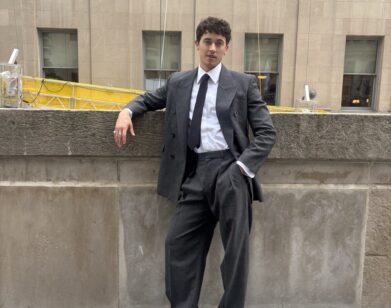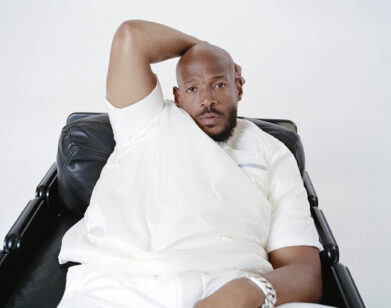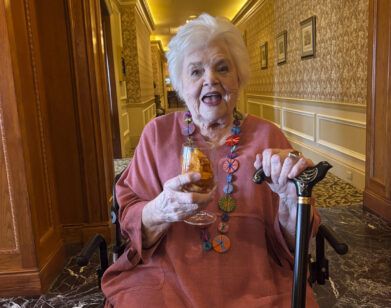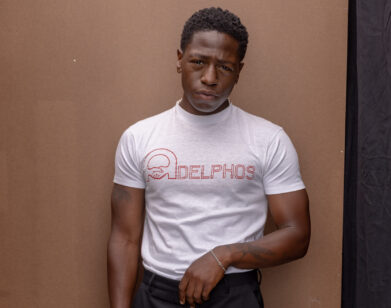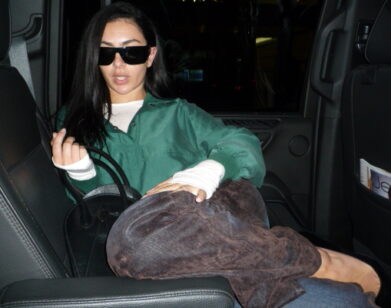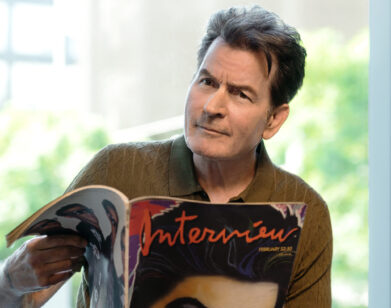Natasha Lyonne, Locked Up
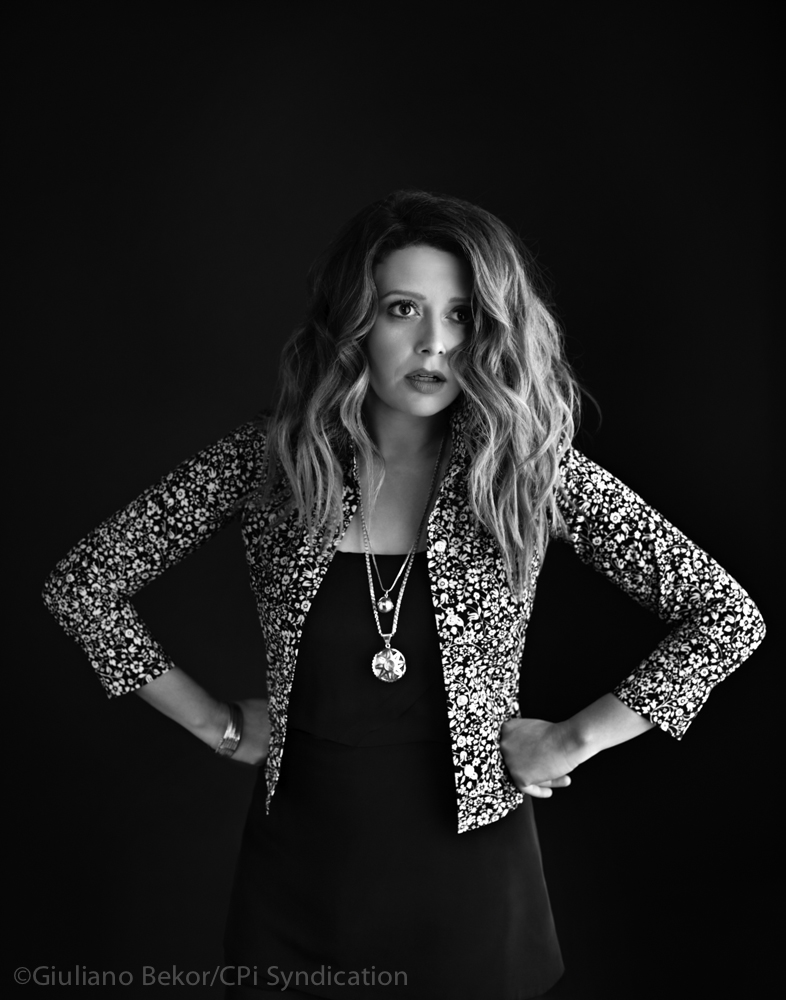
ABOVE: NATASHA LYONNE. PHOTO COURTESY OF GIULIANO BEKOR/ CPi SYNDICATION.
The story is simple: Preppy blonde girl meets not-so-preppy brunette girl. Girl falls in love. Girl discovers her girlfriend is in an international drug cartel. Girl agrees to carry drug money across continents. 10 years later, preppy girl is in a minimum-security women’s prison in Connecticut, being “starved out” by a large Russian inmate known as “Red.”
The premise for Netflix’s latest original series, Orange is the New Black, might seem a little ludicrous, but this is roughly what happened to activist and author Piper Kerman. Created by Weed‘s Jenji Kohan, the show is based on Kerman’s 2010 memoir, with Taylor Schilling playing Piper “Chapman” and Jason Biggs as her confused fiancé Larry. Other familiar faces include Laura Prepon as Piper’s former drug-dealing lover, The Wire‘s Pablo Schreiber as a perverted prison guard nicknamed “Pornstache,” and Natasha Lyonne as the well-meaning but mischievous inmate Nicky Nichols.
An actress since the age the age of seven, Orange is the New Black is Natasha Lyonne’s first television show as a series regular. Frank, funny, and a true New Yorker, Lyonne is best known for her roles in Woody Allen’s Everybody Says I Love You (1996), various American Pies (1999-2012), and the ’90s cult films, Slums of Beverly Hills (1998) and But I’m a Cheerleader (1999), and, unfortunately, her brief stint as a troubled tabloid favorite.
EMMA BROWN: Are you in New York?
NATASHA LYONNE: Yes, I’m in New York and I just got the air conditioning units reinstalled for the summer. It’s fucking disgusting out. There’s a really specific smell that I remember from my childhood of when the filth hits the humidity—really, only in New York. You know?
BROWN: Yes, sadly. I watched the first couple episodes of Orange is the New Black. In passing, we learn that your character Nicky Nichols is incarcerated for drugs. Is there going to be a flashback episode that reveals exactly what happened to her?
LYONNE: As the season develops, we really get to know all of the characters and how they come by their tough-guy exteriors. It’s almost like when you meet somebody, you just know this superficial layer of them. You can gather a lot from your first impression of a person, but the deepening experience of really getting to know someone is sort of the whole magic of relationships in this life. It’s interesting to have that with a character. I’ve never done a TV show before; I’ve only done a couple episodes here and there of Will and Grace and New Girl, and I guess Pee Wee’s Playhouse, but I probably wasn’t thinking so hard at that time about, “Where does Opal really come from? What’s really in her heart? How did she get to this playhouse?” [laughs] Which maybe speaks volumes for the wisdom of children, but certainly as an adult it’s satisfying—you’re along for the ride of finding out how a person gets to be the way they are.
BROWN: How much did you know about Nicky when you first signed on?
LYONNE: I spoke to Jenji [Kohan] a bit. The reality is, just with my own life experience I definitely have that to draw on. I have a lot of friends who are trying to clean up their act, or that are still making trouble for themselves, so I’m definitely well-versed on what goes on in the mind and the heart of a person who self-destructs as their coping mechanism, and also what they’re like when you take their preferred substance away. Jenji and I discussed that, and I got a good amount of insight from her. I think it’s interesting that how [Nicky] presents herself in prison is different from the way she grew up. This idea that you don’t have to necessarily come from this crazy, fucked-up world on the outside to end up fucked up on the inside.
BROWN: How far is Nicky along the road to recovery?
LYONNE: She’s clean in prison. The question for her is what she would do if given the opportunity to get back out there. In this season, my sense was that she wasn’t so far along that if that temptation came her way, I think it would still be appealing to her.
BROWN: How does Netflix’s release strategy for Orange is the New Black—where all the episodes come out as once—affect how you approached filming it?
LYONNE: [Filming] you sort of fall into the very specific world of these characters because it’s over this six-month intensive period. You’re going to work every day in a jail cell or a defunct psychiatric institution in Rockland over a freezing winter. It’s similar to theater over the winter; a month into the run you’ve forgotten that you’re acting and you’re just showing up, existing. That’s when it really gets exciting. I have this fantasy of Martin Sheen going into the jungle like Apocalypse Now and it becomes this six-month odyssey. It’s very different than doing an independent movie—especially these days they make so many of those over a 20-day shooting schedule. It can turn out great, but you’re running off adrenaline. You don’t get the opportunity to get into the belly of the beast as much.
BROWN: When I think of prison dramas, the first things that come to mind are these very raw, violent, masculine films and series like the Shawshank Redemption or Oz. How does Orange is the New Black compare to these more traditional portrayals of prison?
LYONNE: Jenji has such a specific and satisfying eye for the many peculiarities of life. I don’t know if you read that article on Orson Welles where he [says] he thinks of Citizen Kane as a comedy. Just because it makes us feel something, doesn’t mean that it’s not funny. When I read that, I was like, “Shit, that’s very Jenji.” It’s something I strongly identify with as somebody who’s had a wild ride of a life experience. The whole thing has to become sort of a comedy.
As far as the question of men goes… [when I watched the show], I’m certainly not so delusional that I thought [I] was going to be like Paul Newman in Cool Hand Luke. I didn’t expect Warren Oates. But I kind of expected to emerge in my khaki uniform like Dustin Hoffman in Midnight Cowboy or something. I know I’m not John Voight, but at least I thought Dustin Hoffman would come on with ’70s male swagger and be sort of like a weird cowboy-convict. Instead it was just sort of this frizzy-haired troublemaker. It was pretty funny: “Oh yeah, it’s women’s prison!” [laughs] You don’t register these ’70s men. The joy of the show was just getting to work with so many women. We’ve become homogenized and everybody seems to look the same and that’s the big achievement in life—getting down to a certain weight so you can wear the same outfit as everybody else with the same spray tan as everybody else. I can’t say I hang out a ton of people who are like that; there are still a lot of people fighting the good fight. I do think that often on more mainstream television, you’d expect that if you got a giant cast of 50 or 100, there’d be a bunch of actresses who look like stupid actresses. [laughs] Instead we have the most incredible cast and there are all these singular women milling around. For some reason I think of Burt Young in Once Upon a Time in America, and him laughing and eating a fucking sandwich. There’s always a real cast of characters in a lot of those male-driven movies that we love. Finally women are allowed to be just as raw and play the tough guy.
BROWN: Is there any one character where you’re like, “I want that storyline! “
LYONNE: [laughs] I definitely enjoy Taystee [Danielle Brooks] and Poussey [Samira Wiley], who are both amazing. [Danielle and Samira] are both these Julliard graduates. They’re the real deal, these two. We don’t necessarily have scenes together, but I really enjoyed watching them play off each other. Maybe I was also so impressed because I went to Tisch for, like, five days, [laughs] and I’m so impressed by the Julliard to convict storyline and how nobody will ever know that about them. I think that’s so cool that they can be so raw and so highbrow at the same time.
BROWN: Did you have a chance to talk to Piper Kerman about her experiences in prison—when she found the humor in something that is actually pretty horrible?
LYONNE: I just met her a few of times and I think Taylor spent a fair bit of time with her. I heard Taylor talk about how she was saying that the whole experience was just very surreal—just the whole concept of like some bougie girl from Park Slope selling soap at Barneys and then shuttled into that world. For better or worse, your true nature gets exposed under those conditions; how you cope and adapt with the end of freedom, essentially.
BROWN: Do you think the relationships made in prison can weather the outside world?
LYONNE: The premiere is tonight, so I’m going to ask Piper that question. I feel like there’s some mention that she does stay in touch with some people, but I’d be curious to know which characters and for how long. Life is a wildly transient thing with people coming into your life and dropping away. It definitely takes work to maintain relationships. In my experience ending up in a treatment facility, a lot of it is contingent on other people saying, “Well, we’ll end up going back out too.” In a women’s prison—or in any prison—the statistics of people that fall deeper into a life of crime as a result of being incarcerated are so severe that it’s quite possible that the guy who is trying to stay on the straight and narrow ends up losing some of his prison friends. Similar to my rehabilitation chapters, not many stay standing. The bonds that you form in there are so important. It’s a wild thing, that people have the ability to help each other by just relating to one another. It certainly extends to the arts at large. It’s essentially what we’re doing—communicating with each other about the human condition. In comedy especially, it often feels like a way of saying, “Hey, I’m self-conscious too, can’t we all just shine a light on it and bend the shame around it and move on.” With prison, I imagine that it’s even worse than rehab in the sense that do you even really want to think back to that chapter of your life? Now I’m wondering if any of the real-life characters are going to be at the premiere tonight. That would be pretty amazing.
BROWN: I don’t know how you would politely ask someone that.
LYONNE: Yeah. [laughs] Just start walking up to people and be like, “Hey, I was doing this interview today… were you in jail? What’s the deal? What kind of a criminal are you?”
BROWN: Do you have a favorite anti-heroine from fiction?
LYONNE: Sheesh. I think I would say Susan Tyrrell in Fat City. Have you seen that movie? It’s a great movie. It’s John Huston and a young Jeff Bridges as a boxer and Stacy Keach and Susan Tyrrell as an alcoholic couple. She is pretty epic just as far as the level of identification and compassion that you have with this woman. I also love Giulietta Masina in Nights of Cabiria. Oh! You know who else? (Now you’ve got me going.) Linda Manz in Out of the Blue. Jeeze Louise, that’s anti-heroine city. Seeing Linda Manz in that movie as a teenager definitely helped me feel like, “Oh, I’m not that alone in this life. There’s a language for the way I feel and I if I can just find the right people I’ll be okay.” The world at large doesn’t always make sense to me, and there are safe havens. Linda Manz in Out of the Blue is one of them.
BROWN: I know you don’t have any scenes with Jason Biggs, but did you see him at all on set? Did you know he was going to be on the show?
LYONNE: I got to tell you, and maybe he won’t be thrilled that I’m saying this, but I had such limited exposure to Jason during all those American Pie movies, that when I was spending time with him on this show I was like, “Holy shit, you’re a really funny person!” Legitimately, I had no idea. I don’t think I watched any of those movies all the way through. If he’s that funny in the movies, they totally should have been hits. I just always thought they were these weird teen movies and not my bag, but he’s hilarious! His text-messaging skills are really in another level. Having this weird, shared history has been pretty fun—this is the most Jason Biggs I’ve gotten in all those fucking years. The only person I’m really in touch with is Eddie Kaye Thomas, who I really adore and is a pretty great character, too. But I just never had a ton of exposure to Jason, and I’m just enjoying him and his wife so much; he’s just a really funny person. He’s always like, “Will you stop saying that? It’s kind of insulting.” [laughs] But I’m having a nice time with him. I think he’s really great in the show, too. It’s very exciting to see him like that. There was a time in the ’70s when guys like Elliott Gould and Albert Brooks… here’s what’s weird about Jason: he’s not a Jew. He says he’s circumcised, though. I guess only the pie knows. He seems circumcised to me, but I don’t need to know. I like to let that be a mystery. Maybe I’ll ask tonight when I’m done walking around asking everyone if they’re convicts. But, as I was saying, Albert Brooks and Elliott Gould always seemed like very Jew-y guys, the guy who was funny as more of an afterthought. I think they didn’t used to be so delineated—what was comedy and what was drama—and I think he’s doing such a beautiful job in the show. He’s finally been given the opportunity to get in there. I was really impressed. I certainly wouldn’t tell him that.
SEASON ONE OF ORANGE IS THE NEW BLACK WILL BE AVAILABLE VIA NETFLIX THIS THURSDAY, JULY 11.

